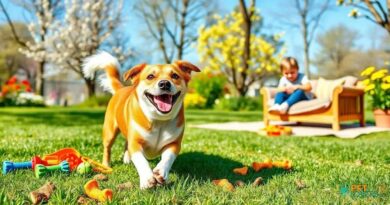O que é group play
What is Group Play?
Group play refers to a social interaction format where multiple dogs engage in play activities together. This concept is particularly popular in dog parks, training classes, and daycare facilities, where dogs can socialize and exercise in a safe environment. Group play allows dogs to develop their social skills, learn appropriate behaviors, and expend energy in a fun and engaging way.
The Benefits of Group Play
One of the primary benefits of group play is the opportunity for dogs to interact with their peers. This interaction helps to reduce behavioral issues that may arise from boredom or lack of socialization. Dogs that participate in group play often exhibit improved confidence, better communication skills, and enhanced physical fitness. Additionally, group play can lead to healthier relationships between dogs and their owners, as well-socialized dogs are typically easier to manage.
Safety Considerations in Group Play
While group play can be beneficial, it is essential to prioritize safety. Not all dogs are suitable for group play, especially if they exhibit aggressive tendencies or are overly shy. Before allowing a dog to participate in group play, it is crucial to assess their temperament and ensure they are up-to-date on vaccinations. Supervision by trained professionals can also help prevent conflicts and ensure that all dogs are playing safely.
Types of Group Play Activities
Group play can take many forms, including structured games, agility courses, and free play sessions. Structured activities often involve specific games that encourage teamwork and cooperation among dogs, such as fetch or tug-of-war. Agility courses provide physical challenges that stimulate both the mind and body, while free play allows dogs to engage in spontaneous interactions, promoting natural play behaviors.
How to Prepare Your Dog for Group Play
Preparing your dog for group play involves several steps. First, ensure that your dog is well-socialized and comfortable around other dogs. Gradual introductions to new environments and dogs can help ease any anxiety. Basic obedience training is also beneficial, as it allows your dog to respond to commands during play. Lastly, consider scheduling a trial session to observe how your dog interacts in a group setting.
Choosing the Right Group Play Environment
Not all group play environments are created equal. When selecting a location for your dog, look for facilities that prioritize safety, cleanliness, and supervision. Dog parks can be a great option, but they may not always provide the level of control needed for safe interactions. Consider enrolling your dog in a reputable daycare or training program that offers structured group play sessions led by experienced staff.
Signs of Positive Group Play
During group play, it is essential to recognize signs of positive interactions among dogs. Playful barking, wagging tails, and relaxed body language indicate that dogs are enjoying themselves. Additionally, dogs that take turns chasing each other or engaging in play bows are displaying healthy social behaviors. Monitoring these signs can help ensure that all dogs are having a good time and that play remains friendly.
Recognizing Negative Behaviors in Group Play
While group play can be enjoyable, it is crucial to be aware of negative behaviors that may arise. Signs of aggression, such as growling, snapping, or stiff body posture, should be addressed immediately. If a dog appears overly anxious or is constantly trying to escape, it may be best to remove them from the situation. Understanding these behaviors can help maintain a safe and enjoyable environment for all participants.
Group Play and Dog Training
Group play can also serve as an excellent complement to dog training. Many trainers incorporate play into their sessions to reinforce positive behaviors and teach new commands. By allowing dogs to socialize while learning, trainers can create a more engaging and effective training experience. This combination of play and training can lead to well-rounded dogs that are both obedient and sociable.
Conclusion
Group play is an essential aspect of a dog’s social development, providing numerous benefits for both dogs and their owners. By understanding the dynamics of group play, recognizing positive and negative behaviors, and ensuring a safe environment, dog owners can foster healthy social interactions that contribute to their pet’s overall well-being.




